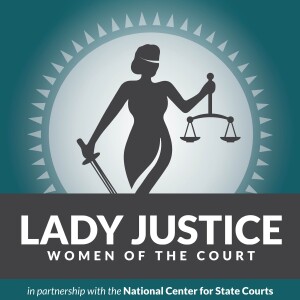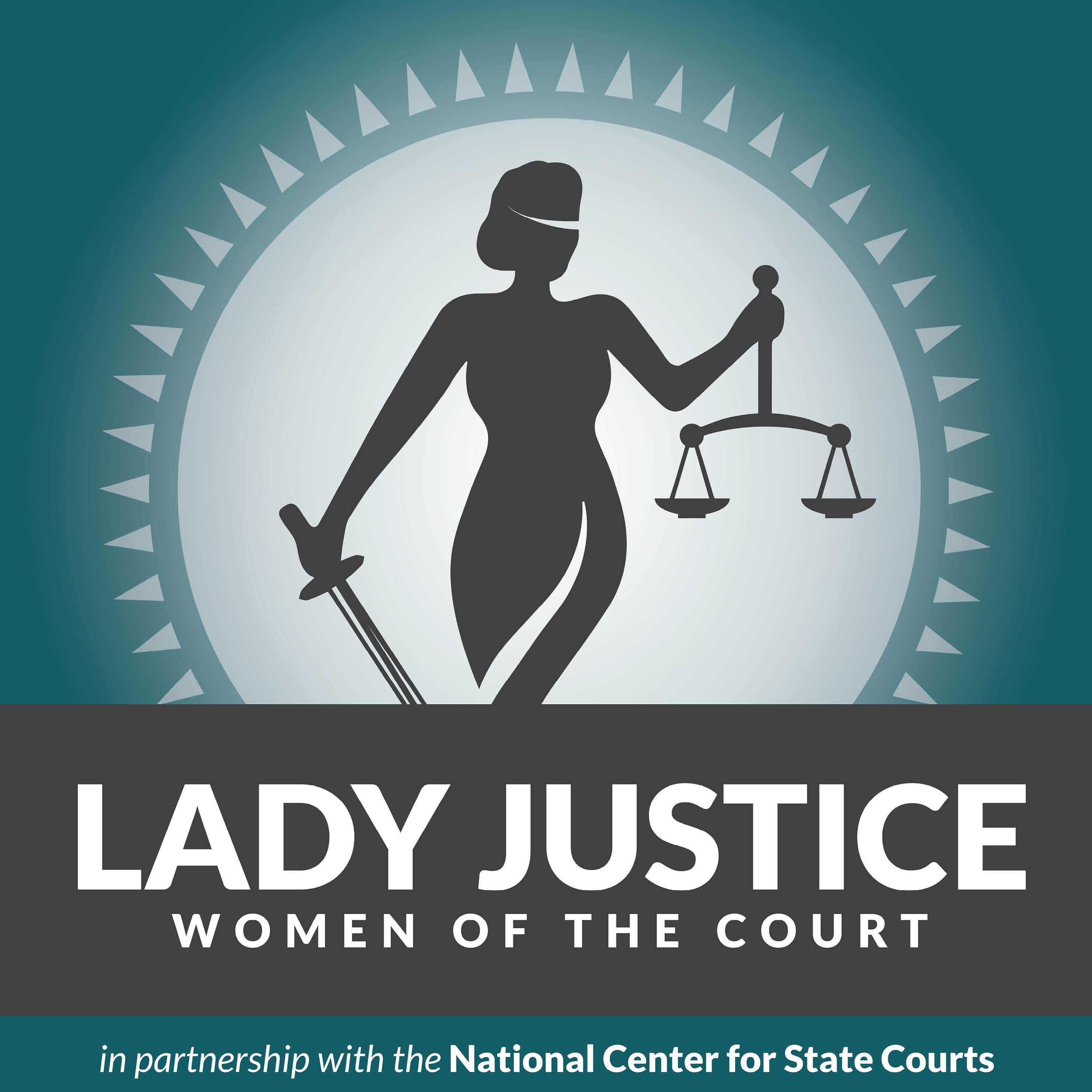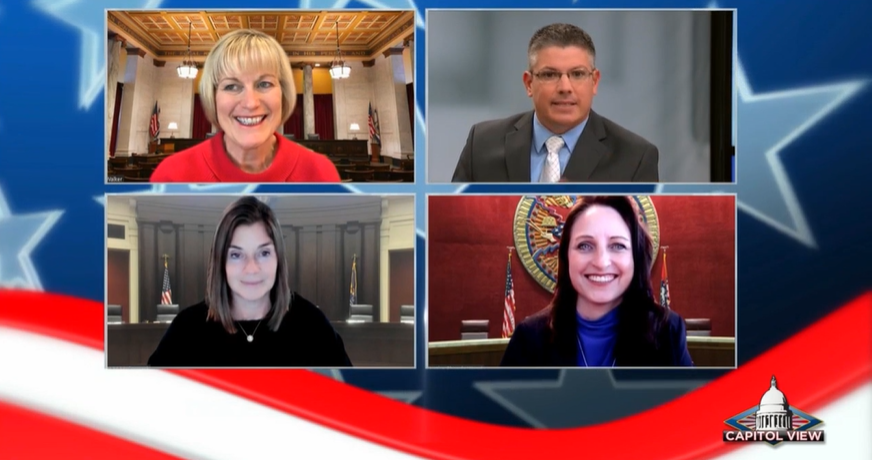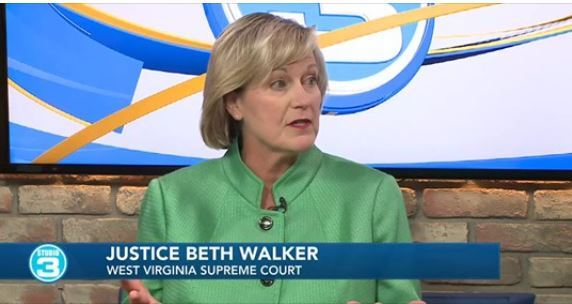Co-hosts Justices Beth Walker of the Supreme Court of Appeals of West Virginia and Rhonda Wood of the Arkansas Supreme Court talk about their role as women justices in their respective state supreme courts. They share their experiences and insights and discuss the accomplishments and challenges faced by women in state courts. Along with their invited guests, they cover topics such as the importance of state constitutional law, how courts operate, the meaning of justice, and why state courts matter.
Episodes

Monday Dec 02, 2024
Monday Dec 02, 2024
In this poignant episode of Lady Justice: Women of the Court, hosts Justice Rhonda Wood and Justice Beth Walker are joined by Doris Huffman, Executive Director of the Nebraska State Bar Foundation. This episode marks the one-year anniversary of the passing of Justice Sandra Day O’Connor, the first female U.S. Supreme Court Justice, renowned for her unwavering commitment to civics education.
The National Center for State Courts celebrates her legacy through the Sandra Day O’Connor Award for the Advancement of Civics Education, which the Nebraska State Bar Foundation received this year.
Topics Discussed:
- The crucial role of civics education and the importance of familiarizing the public with courtrooms and judicial processes.
- The Foundation’s impactful programs: the Mock Trial Program, Student Reporter Program, and Bench Media Committee.
- Insights into the judicial learning centers of each host’s respective state court.
Tune in to discover how the Nebraska State Bar Foundation is advancing civics education and honoring Justice Sandra Day O’Connor’s remarkable legacy of promoting public understanding of the judiciary.
Resources:
- https://www.nebarfnd.org/
- https://www.courtswv.gov/public-resources/learning-center
- https://arcourts.gov/administration/education/about

Thursday Nov 14, 2024
Season 5, Episode 3: Reforming Legal Education, Insights from Leaders of CLEAR
Thursday Nov 14, 2024
Thursday Nov 14, 2024
In this episode of Lady Justice: Women of the Courts, hosts Justice Rhonda Wood of Arkansas and Justice Beth Walker of West Virginia are joined by Chief Justice Gordon J. MacDonald of New Hampshire and Justice C. Shannon Bacon of New Mexico to discuss the pivotal work of the Committee on Legal Education and Admissions Reform (CLEAR). As Chair and Vice Chair of CLEAR, the justices share their efforts to drive transformative changes in legal education and attorney licensure.
Key Topics Include:
- CLEAR's Mission: Insights into CLEAR’s initiatives, including community listening sessions and the release of their final report in July 2025, which will shape the future of legal education.
- Reforming Legal Education: Addressing the need for modernization to better serve underserved communities, including rural areas facing a shortage of legal representation.
- Alternative Pathways to Licensure: Exploring innovative options for individuals to enter the legal profession without the traditional bar exam, providing flexibility for those seeking legal careers.
- Supporting Rural Legal Practice: Creative strategies to attract and retain lawyers in rural areas through fellowships and support programs, tackling the growing issue of legal deserts.
- NextGen Bar Exam: Shifting from rote memorization to practical, skills-based testing that prepares law graduates for real-world practice.
This episode offers an in-depth look at how state supreme courts are leading efforts to ensure that legal education evolves to meet modern demands while upholding ethical and accessible legal practices. Don’t miss this conversation on the future of legal education and the essential reforms needed to protect public and professional interests.
Resources:
- https://www.ncsc.org/consulting-and-research/areas-of-expertise/access-to-justice/clear
- https://ncsc2.iad1.qualtrics.com/jfe/form/SV_3yYzzMYcwBrdQwK?_gl=1*kjpz87*_ga*MTg2MDY2Nzc3Ni4xNzIxNjU3OTc2*_ga_HB58441DGF*MTcyNDc3OTYyMy42Mi4xLjE3MjQ3ODA4NzcuMC4wLjA. (CLEAR Feedback Form)
- https://nextgenbarexam.ncbex.org/

Monday Oct 21, 2024
Season 5, Episode 2: Judicial Ethics with David J. Sachar
Monday Oct 21, 2024
Monday Oct 21, 2024
In this episode of Lady Justice: Women of the Court, Justices Rhonda Wood of Arkansas and Beth Walker of West Virginia are joined by David J. Sachar, Director of the Center for Judicial Ethics at the National Center for State Courts.
David shares his expertise in working with state and international judiciaries to develop policies and training programs that uphold public trust, safeguard judicial independence, and reinforce the rule of law.
Topics Discussed:
- The importance of judicial ethics and the role of statewide judicial ethics commissions
- The work and mission of the Center for Judicial Ethics
- Differences in judicial ethics processes between state and federal courts
- The intersection of judicial ethics with AI and emerging technologies
- Ethical guidelines and considerations for judges using social media
- How judges can be disciplined and the potential consequences or sanctions
This episode is a must-listen for anyone interested in judicial ethics and maintaining public confidence in our courts. Tune in to hear insights from one of the leading experts on judicial integrity.
Resources:
-https://www.ncsc.org/consulting-and-research/areas-of-expertise/court-leadership/center-for-judicial-ethics
-https://www.ncsc.org/consulting-and-research/areas-of-expertise/communications,-civics-and-disinformation/social-media-and-courts/judges
- https://www.ncsc.org/__data/assets/pdf_file/0010/101125/ncsc-ai-rrt-judicial-legal-ethics-may-2024.pdf

Monday Sep 16, 2024
Season 5, Episode 1: A Life for Liberty, An Interview with Randy Barnett
Monday Sep 16, 2024
Monday Sep 16, 2024
In this special Constitution Day episode of Lady Justice: Women of the Court, hosts Justice Rhonda Wood of Arkansas and Justice Beth Walker of West Virginia sit down with Randy Barnett, the Patrick Hotung Professor of Constitutional Law at Georgetown University and Director of the Georgetown Center for the Constitution. Together, they dive into a thought-provoking conversation about Barnett’s latest memoir, A Life for Liberty: The Making of an American Originalist, and explore his journey from a prosecutor in Chicago to becoming a leading voice in the originalism movement.
Barnett shares insights into the federal and state constitutions, the amendment processes, and his expertise on the Ninth Amendment. The discussion delves into the principles of originalism, the impact of abolitionist Lysander Spooner, and the significance of the “lost constitution.” The episode also offers a glimpse into Barnett’s forthcoming work, Felony Review: Tales of True Stories of Crime and Corruption in Chicago, drawing on his experiences as a prosecutor.
Listeners will also gain valuable advice on the importance of mentorship and learn about the influential mentors who shaped Barnett’s career. This episode provides a compelling look at the intersection of law, history, and personal conviction, offering inspiration for anyone passionate about justice and liberty.
Topics Discussed:
- The differences between the federal Constitution and state constitutions, and their respective amendment processes
- The origins and principles of originalism
- Key insights into Barnett’s memoir, A Life for Liberty: The Making of an American Originalist
- The role of mentorship in Barnett’s career and personal growth
- Discussions on the Ninth Amendment and the concept of the “lost constitution”
- Reflections on Lysander Spooner’s The Unconstitutionality of Slavery and its influence on originalism
- A preview of Barnett’s upcoming book, Felony Review: Tales of True Stories of Crime and Corruption in Chicago
Don’t miss this engaging conversation that blends constitutional law, history, and the personal stories of one of America’s foremost legal scholars. Tune in now!
Resources:
-https://www.randybarnett.com/
-https://www.law.georgetown.edu/faculty/randy-e-barnett/
-https://www.amazon.com/Life-Liberty-Making-American-Originalist/dp/1641773774
-https://archive.org/details/unconstitutionalit00spoo
-https://www.ncsc.org/education-and-careers/civics/constitution-day

Monday Jun 24, 2024
Monday Jun 24, 2024
In this insightful episode of the Lady Justice: Women of the Court podcast, hosts Justice Rhonda Wood of Arkansas and Justice Beth Walker of West Virginia explore the role of artificial intelligence (AI) in the judicial system with esteemed guests: Justin Forkner, Chief Administrative Officer of the Indiana Judicial Branch, and Stacey Marz, Administrative Director of the Alaska Court System.
Together, they discuss:
- The integration of AI-driven tools to aid court processes, including natural language processing systems that translate legal jargon into plain language and provide live transcripts of court proceedings, as well as tools that review legal citations in briefs.
- The potential for GenAI (Generative Artificial Intelligence) to replace traditional search engines and enhance self-help resources for litigants.
- Improving digital content, such as court webpages and chatbots, to enhance access to justice through search engine optimization, user-friendly design, plain language copy, and more.
- Exciting innovations and updates on the horizon for the Indiana Judicial Branch and Alaska Court System.
Tune in to discover more about the innovative use of AI in the judicial system and its transformative impact on court processes.
Resources:
-https://www.law360.com/pulse/legal-tech/articles/1833092/how-courts-can-use-generative-ai-to-help-pro-se-litigants
-ncsc.org/ai

Monday May 20, 2024
Monday May 20, 2024
Dive into the transformative world of Artificial Intelligence (AI) and its impact on the court system with hosts Justice Rhonda Wood of Arkansas and Justice Beth Walker of West Virginia, along with special guest Professor Amy Cyphert. Professor Cyphert is a pioneering academic in AI at West Virginia University College of Law. She directs the ASPIRE Office, guiding students in securing scholarships and fellowships, and teaches a course on AI and the Law.
Together, they explore:
-The rapid advancements in Generative AI and its implications for legal practice.
-Professor Cyphert’s pioneering work in teaching AI and its impact on the legal landscape.
-The concept of "AI cannibalism" and the importance of human input in AI systems.
-The challenges of distinguishing between AI-generated content and human-authored text.
-The evolving role of lawyers in the era of AI.
Resources:
-Professor Amy Cyphert’s Biography
-Cyphert, A. (2021, November 1). A Human Being Wrote This Law Review Article: GPT-3 and the Practice of Law. UC Davis Law Review, 55(1). WVU College of Law Research Paper No. 2022-02.
-Cyphert, A., Perl, S., & Tu, S. S. (2023). Artificial Intelligence Cannibalism and the Law.
-"Play a sound on a device with Find Devices on iCloud.com." Apple Support. Retrieved April 2024, from https://support.apple.com/guide/icloud/play-a-sound-on-a-device-mmfc0f19b5/icloud#:~:text=If%20you%20lose%20your%20device,on%20a%20family%20member's%20device.

Monday Apr 29, 2024
Monday Apr 29, 2024
Join hosts Justice Rhonda Wood of Arkansas and Justice Beth Walker of West Virginia as they delve into the recent Supreme Court of the United States decision in Lindke v. Freed. Their discussion shines a light on how this ruling affects the public, public officials, and state court judges.
Special guest Caroline Mackie, Partner at Poyner Spruill, LLP, provides an insightful, in-depth analysis of the case. They explore the delicate balance between promoting public confidence and education via social media while upholding the First Amendment rights of the public and public officials.
Discussion Points:
-Analysis of Kevin Lindke's Lawsuit Against James Freed for First Amendment Violation
-Impact of Lindke v. Freed Decision on Public Officials and First Amendment Rights
-Caroline Mackie's Amicus Brief: Advocating for Clear Social Media Guidelines for Public Figures
-Examining the Intersection of Private and Public Life on Social Media Platforms for Public Officials
-Tips for Navigating Social Media for Public Figures, as outlined by Associate Justice Amy Coney Barrett's Opinion
Resources:
- Supreme Court Case
https://www.supremecourt.gov/search.aspx?filename=/docket/DocketFiles/html/Public/22-611.html
- Amicus Brief
https://www.supremecourt.gov/DocketPDF/22/22-611/270245/20230630170439817_22-611%20Amicus%20BOM%20IMLA.pdf

Monday Mar 25, 2024
Season 4, Episode 5: New Partnership
Monday Mar 25, 2024
Monday Mar 25, 2024
Join hosts Justice Rhonda Wood of the Arkansas Supreme Court and Justice Beth Walker of the West Virginia Supreme Court on the Lady Justice Podcast, now in partnership with the National Center for State Courts (NCSC). In this episode, they welcome Anna Blackburne-Rigsby, Chief Judge of the District of Columbia Court of Appeals and current President of the Conference of Chief Justices (CCJ).
Chief Judge Blackburne-Rigsby shares insights into the structure of DC Courts, judicial appointments, and the types of cases handled. Reflecting on her upbringing in Washington, D.C., Chief Judge Blackburne-Rigsby also discusses the city's evolution and emphasizes the role of law in driving societal change, particularly evident during the Civil Rights era.
The episode delves into the collaborative efforts of CCJ, including past initiatives during the COVID-19 pandemic to guide courts and current efforts to enhance public trust. Chief Judge Blackburne-Rigsby highlights the importance of judicial leadership and community engagement beyond the courtroom.
Tune in for valuable insights into the judiciary and the transformative power of law. Don't miss the lightning round, where Chief Judge Blackburne-Rigsby shares some personal preferences!

Tuesday Feb 06, 2024
Season 4, Episode 4: Justice Bus
Tuesday Feb 06, 2024
Tuesday Feb 06, 2024
In this episode, the Lady Justices discuss the importance of equal access to justice. They welcome special guests Tennessee Supreme Court Justice Jeff Bivins and Anne-Lousie Wirthlin the Director of Access to Justice and Strategic Development for the Administrative Office of the Tennessee Courts.
Justice Walker was live on location in Nashville Tennessee with Justice Bivins and Mrs. Wirthlin. In this special episode, our special guests share about their Tennessee access to Justice Bus. The Justice Bus is a mobile law office that brings technology and legal help to rural and underserved communities across Tennessee.
In the lighting round our Lady Justices and special guests share their most used phone app, their favorite country music artist past or present, their lockscreen photos, and lastly their favorite city to visit.
For more information about the Tennessee Justice Bus, see the link below.
https://justiceforalltn.org/justice-bus/

Wednesday Nov 22, 2023
Season 4, Episode 3: Reunion Special, The Girls Are Back In Town
Wednesday Nov 22, 2023
Wednesday Nov 22, 2023
In this episode, Chief Justice Beth Walker of West Virginia and Justice Rhonda Wood of Arkansas welcome special guests, the original co-hosts, former Chief Justice Bridget McCormack of Michigan and former Justice Eva Guzman of Texas for a special reunion episode.
The four lady justices share personal stories on the importance of connection and the rewards of getting out of your comfort zone. They share the most significant changes in their life since they were all together last, what challenges they may face in the coming year, and how they overcome difficult days.
How it Started
Before the creation of the Lady Justice: Women of the Court podcast, the four women came together in April 2020 to answer questions about the judicial branch of government posed by Justice Rhonda Wood's granddaughter, Blakeley. After the recording of this video, the justices decided they wanted to get together more often to create educational content.
In the News
KARK in Arkansas: Lady Justices on Capitol View
WSAZ in West Virginia: Lady Justice: Women of the Court on Studio 3
Little Rock Soiree: 5 Podcasts Led by Women in Arkansas
Law.com: Hear Ye, Hear Ye! Four Women State Supreme Court Justices Launch Podcast
Metro News in West Virginia: West Virginia Supreme Court justice joins court podcast

Contact Us
Be a part of the podcast! Record a voicemail at the link below:
https://www.speakpipe.com/LadyJustice
Or, e-mail a question or comment to: podcast@arcourts.gov



